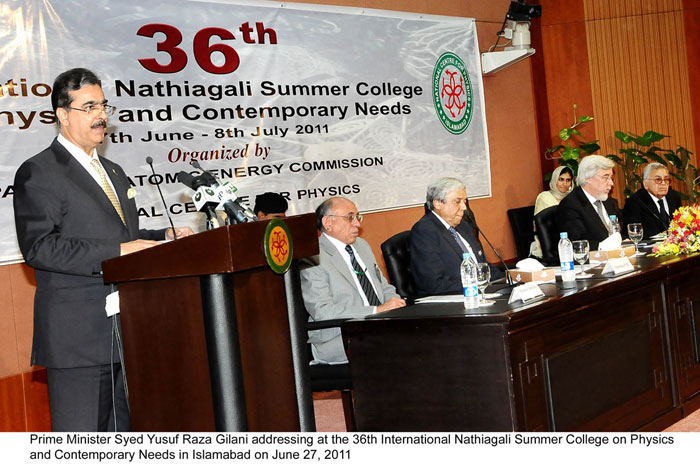Pakistan to build more nuclear plants to overcome energy needs: PM
ISLAMABAD, June 27 (APP): Prime Minister Syed Yusuf Raza Gilani Monday categorically stated that country’s nuclear capability was purely for peaceful purposes and it would build more power plants to meet its growing energy needs. Addressing participants of the “36th International Nathiagali Summer College on Physics and Contemporary Needs”, Gilani said Pakistan in this regard, would continue to comply with the requirements of International Atomic Energy Agency’s nuclear safeguard agreements.“Building and operating nuclear power plants is vital to country’s interests because of its severe energy deficiency,” Gilani said.
Gilani said Pakistan believed in a meaningful coexistence and reconciliation, and would always strive for development and prosperity in the region.
Prime Minister Gilani lauded the contributions of Pakistan Atomic Energy Commission for basic and applied sciences, adding that the expansion in the country’s Civil Nuclear Power Program was commendable.
The Prime Minister recalled inaugurating the second unit at Chashma Nuclear Power Complex - C-II, that enhanced nuclear power generation to 625 Mega Watts.
He said that based upon previous performance, the Atomic Energy Commission was not only poised to achieve the 8,800 mega watts Nuclear Power production by 2030.
He hoped it would also look beyond 2030 to build more nuclear power plants, as directed by him following the inauguration of Chashma - 2.
Gilani said the fate of countries today was determined by their economic competitiveness and stressed the need to understand and appreciate the implications of competition in the global market-driven economy.
He said keeping in view the pivotal role of science the government had allocated appropriate funds for the development of trained and qualified human resource. He said support would be provided to establish research laboratories to provide employment to this trained manpower.
The Prime Minister said the government was fully supportive of such activities and looked forward towards active collaboration with CERN - The European Organization for Nuclear Research, for innovative research resulting in major scientific breakthroughs.
He hoped this collaboration would provide increased opportunities for continuation of research in the country.
He acknowledged the contributions of the country’s Noble Laureate late Professor Abdus Salam, who was the founder and a passionate supporter of International Nathiagali Summer College.
Gilani said the Nathiagali Summer College had over the years provided great stimulus to the scientific activities in the region particularly Pakistan.
He said such forums have become a prestigious event in the scientific calendar of the developing world and have duly been recognized for discussing most recent trends and results in various fields of physics.
Gilani appreciated the productive efforts of country’s scientists in the fields of agriculture, biotechnology, industry and health, which he said had been largely possible owing to the investment in human resource development.
He mentioned that Shaheed Zulfiqar Ali Bhutto and Shaheed Mohtarma Benazir Bhutto laid the foundations of pursuit of scientific knowledge in the country, which was bearing fruits today.
He stressed utilizing of science as an intellectual pursuit to general progress, adding that industrialized nations must actively assist the less developed nations in this regard.
Chairman PAEC Dr. Ansar Parvez in his welcome address said it was only through science and technology that a nation can find its place in the select group of knowledge based nations. He stressed the need to undertake dedicated efforts to transform the society accordingly.
Dr Parvez said the Pakistan Atomic Energy Commission was currently providing health care through 14 nuclear medical centres, providing diagnostic treatment to more than half a million cancer patients.
He said two more centres would start functioning this year in Swat and Benazirabad (Nawabshah), while two more would be made operational at DI Khan and Bannu. He said the PAEC has also installed a Cyclotron and a Positron Emission Tomography and imaging facility at Lahore that would increase cancer diagnostic capabilities in Pakistan.
Dr Parvez said the PAEC was also revisiting safety measures after the Fukushima accident in Japan and to ensure effective emergency response system, in coordination with the National disaster Management Authority.
Director General CERN (European Organization for Nuclear Research) Dr Rolf Heuer stressed quality training of new engineers and scientists and said no nation can make progress in the world of science alone, but need to move in tandem.
He also appreciated Pakistan’s collaboration with CERN and for participating in its experiments to learn about the creation of universe by providing some engineering components and detectors.



 28-06-2011 12:03:10
|


